May
12
2010
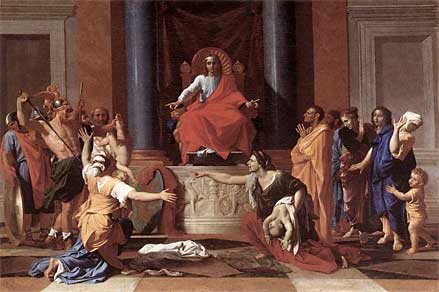
Thoughts on 2 Corinthians 4
For God, who said, “Let light shine out of darkness,” made his light shine in our hearts to give us the light of the knowledge of the glory of God in the face of Christ.
The chapter follows the Creation pattern. Here are the governors of Day 4, the people of God filled with the Law of God at Pentecost. They become the eyes of God. (See Eye Spy – 1: The Insiders).
But we have this treasure in jars of clay to show that this all-surpassing power is from God and not from us.
Continue reading
Comments Off | tags: Bible Matrix, Isaiah, Judges, Lampstand, Literary Structure, Paul, Pentecost, Resurrection | posted in Biblical Theology, The Last Days
Feb
4
2010
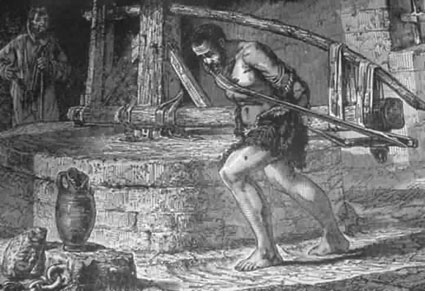
On Day 3 we have grain and fruit plants. They are the promise of bread and wine at God’s Sabbath table on Day 7.
The third elected judge was Deborah. Her song calls for a warrior like the sun. The seventh elected judge was Samson, “Sunrise.”
Continue reading
Comments Off | tags: Creation Week, Deborah, Judges, Nazirite, Samson, Temple | posted in Biblical Theology, The Last Days
Nov
12
2009
 As the end of the ‘Creation week’ (slavery to Sabbath) that created a new nation, there were twelve judges. Twelve is the ‘offspring’ number, being the three of heaven married, multiplied with, the four of the Land.[1] However, we know these brave ‘champions’ were not a sabbath society but a rescue operation after the failure of the Levites.
As the end of the ‘Creation week’ (slavery to Sabbath) that created a new nation, there were twelve judges. Twelve is the ‘offspring’ number, being the three of heaven married, multiplied with, the four of the Land.[1] However, we know these brave ‘champions’ were not a sabbath society but a rescue operation after the failure of the Levites.
Continue reading
Comments Off | tags: Bible Chronology, Bible history, Bible Matrix, Boaz, Judges, Obed, Ruth, Samson, Samuel | posted in Biblical Theology
Sep
22
2009
or Understanding Dominion by Covenant

The New Covenant is not about salvation. It is about dominion. Before you call in the inquisitors, have a look at this diagram from my book:
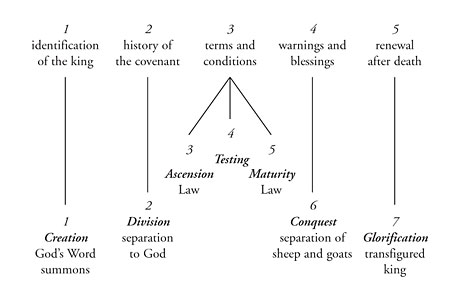
Continue reading
Comments Off | tags: AD70, Caleb, Covenant Theology, Dominion Theology, Feasts, Firstfruits, Gnosticism, Joshua, Judges, Moses, Passover, Postmillennialism, Ray Sutton, Revelation, Solomon | posted in Against Hyperpreterism, Biblical Theology, Christian Life, The Last Days, Totus Christus
May
7
2009

The Nazirite Vow
(Article requested by Drew J.)
This vow in Numbers 6 follows the “inspection of jealousy” in Numbers 5. Mark Horne observed that, just as the woman in Numbers 5 was to be inspected for harlotry with her hair untamed, so the Nazirite (whether male or female) was not to cut his or her hair. A Nazirite is a human picture of the church as a warrior bride. Hair is glory. Hair is the cloud of angels (and now, saints) surrounding the throne of God.
“Therefore the woman ought to have a symbol of authority on her head, because of the angels.” (1 Cor. 11:10)
A woman is the glory of her man. A woman’s hair is a symbol of submission, but also a symbol of her own “cloud of angels” – her godly offspring (See Ezekiel 5 for the children of Israel symbolised as the prophet’s hair, Micah 1:16, Matthew 10:30 and also my comments on Nehemiah and his hair-pulling). In battle, a Nazirite was like a blazing torch (the Ark-chariot/Adam) and smoking firepot (the smoke clouds of the incense altar/Eve army), parting his enemies like the pillar of God.
The hair is her “crop”, the twelve stars around her head (Rev. 12), and the question constantly posed to Israel concerns her role as God’s mediatorial Land. Is her crop one of thorns and thistles, or is it godly grain? This is also the question in Numbers 5, and the Lord put Israel to this exact test after the idolatry with the golden calf. The “harlots” were slain with the Levitical sword.
Continue reading
3 comments | tags: Adam, David, James Jordan, John the Baptist, Judges, Nazirite, Numbers 5, Numbers 6, Obed, Paul, Revelation, Samson, Samuel, serpent, Showbread, Tabernacle, Uriah, Wisdom | posted in Against Hyperpreterism, Biblical Theology
Apr
15
2009
Ordinary People
In Judges and 1 Samuel, the weapons used to defeat the enemy reflect the ordinary people who used them: a tent peg, an ox goad, a millstone, an ass’s jawbone, a slingshot. It was Saul who started throwing spears like a Gentile, like Goliath.
Our weapons are not of this world, but many of them are still physical weapons: bread, wine, water, oil, bended knees, soundwaves, books, gifts, open ears, hospitality, open or closed church doors. These physical things capture people’s thoughts and make them obey Christ.
We live in this world, but we don’t act like its people or fight our battles with the weapons of this world. Instead, we use God’s power that can destroy fortresses. We destroy arguments and every bit of pride that keeps anyone from knowing God. We capture people’s thoughts and make them obey Christ. And when you completely obey him, we will punish anyone who refuses to obey.” 2 Cor 10:3-6 [CEV]
WEPOW
Comments Off | tags: goliath, Holy war, Judges, Saul | posted in Biblical Theology, Christian Life
Apr
11
2009
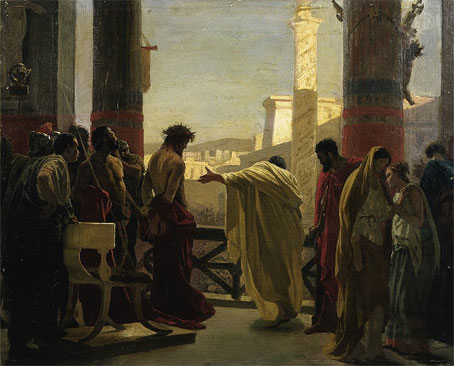
The Jews choose a violent, thieving murderer—like Herod—a beast, for release instead of the Son of God. When forced to choose, they publicly proclaim Caesar (Daniel’s fourth beast) as their king. When Adam is unjust, Eve follows the “light” of a beast.
Like Joseph and Daniel, the obedience of the suffering servant brings a nightmare to the Gentile ruler, or in this case, his wife. She warns Pilate to have nothing to do with “that just man”. From the seat of judgment, he gives the Jews a choice. Like Joseph and Daniel, the Jews unwittingly open the mystery of God.
Jesus is crowned with thorns as Adam’s successor. As Israel, He is a cursed Land bearing a cursed crop—the crown of Abimelech, the bramble king who slays his brothers. Christ dies on behalf of Herod’s kingdom, a compromised rule whose only use was kindling in God’s nostrils.
As High Priest making atonement on the mountain of God, Jesus is again flanked by two men. One ascends to paradise. The other goes to destruction.
Comments Off | tags: Abimelech, Atonement, Crucifixion, Daniel, Joseph, Judges, Pilate, Typology | posted in Biblical Theology
Apr
11
2009
Samson is often presented as a moose.
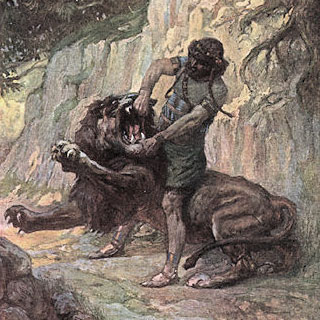 A commonly held opinion is that Samson was stupid. However, his earlier acts were inspired by the influence of the Spirit, carefully calculated, spectacularly executed and achieved the desired results.
A commonly held opinion is that Samson was stupid. However, his earlier acts were inspired by the influence of the Spirit, carefully calculated, spectacularly executed and achieved the desired results.
For instance, Samson only told his wife the answer to his riddle so he would know where the leak came from when she was tested.
This reminded me of the test for harlotry in Numbers 5. The priest administers the bitter word to the woman, and if she passes the test, she will be a fruitful blessing.
Samson’s wife failed the test, and the outcome was a bit like that after the harlotry with the golden calf, with Samson as the slaughtering Levite.
Speaking of which, Numbers 5 comes right before Numbers 6 — the Nazirite vow. Men who took this vow became, basically, warrior brides. Their uncut hair was a sign of submission. Revelation draws on this imagery to describe the apostles and first century saints as virgins.
So Samson’s wife betrayed him, and Samson betrayed his own covenant ‘husband,’ the Lord.
Doug Wilson points out (somewhere) that biblical relationships are more complex than those of Islam. In Islam, the line of authority is linear, the natural outcome of a simple god of power. Might is right, from top to bottom. With Christianity, the submission of the members of the Trinity within the Godhead overflows into family and society, with the members submitting to one another, and constantly bestowing good upon one another.
So Samson can be both a bride and a bridegroom. Facing heaven, a minister is part of the bride. Facing his church, he images the bridegroom.
Comments Off | tags: Doug Wilson, Judges, Numbers 5, Samson, Trinity | posted in Biblical Theology
Apr
10
2009
A Conspiracy of Nations
Amalek is the archenemy of the saints. This first Amalek most likely descended from Japheth. Numbers 24:20 paints him as the original great “Sea beast”, and a counterfeit Alpha and Omega.
“Amalek was the first of the nations, but his end shall be destruction.”
Esau moved to Mount Seir and merged with the Horites to become ahybrid part-Canaanite people known as Edomites. One of Esau’s grandsons was named Amalek (Genesis 36:16), which shows a conscious or subconscious alliance between Gentile hatred and false brother hatred of God’s chosen son—a “Land beast”. This has an enormous impact on interpreting the later history of the Bible.1
Continue reading
Comments Off | tags: Amalek, Bible history, Deborah, Edomites, Esau, Jabin, Jericho, Judges, Resurrection, Sisera, Solomon, Typology | posted in Against Hyperpreterism, Biblical Theology, The Last Days
Apr
10
2009
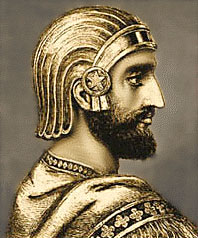 For the ancient world, a garden, a house, a city or a temple was like a woman. An invading army, after storming through the gates of a city, would rape the virgins. It was a brutal reminder that, like the women, the conquered city was not impregnable.
For the ancient world, a garden, a house, a city or a temple was like a woman. An invading army, after storming through the gates of a city, would rape the virgins. It was a brutal reminder that, like the women, the conquered city was not impregnable.
“In order to understand this, we have to think like ancient Hebrews, and not like modern people… Adam was supposed to guard the garden, and he was also supposed to guard his wife.
The Song of Solomon compares the woman to a garden several times in the course of the book. In all languages, the words for city, garden, and the like are feminine, and we speak of a city as “she” in English today.
Let us take a look at the city in the Bible, remembering that what is said of the city is also true of the house, tent, Temple, Tabernacle, and other enclosed homes for humanity. The city has walls and gates. The purpose of these walls and gates is to keep the enemy out. The goal is that the city be impregnable, and note that English word – it directly connects the city with the woman. Thus, the city has to be a virgin, sealed against attack. Jerusalem is referred to as an impregnable virgin repeatedly in Scripture (2 Kings 19:21; Is. 37:22; Jer. 14:17; 18:13; Jer. 31:21; Amos 5:2). The attack on Jerusalem is thus the rape of a city (Lam. 1:15; 2:13)… Just as Eve was “built” from Adam (using an architectural term, Gen. 2:22), so Jerusalem would be rebuilt as a virgin (Jer. 31:4)… Thus, the safety and security of the virgin daughters of Israel was a symbol of the safety and security of the whole land. Their inviolability corresponded to the inviolability of the whole culture (Lam. 1:4; 2:10).”
In the case of Babylon, its walls and gates were impregnable. The city was built on the Euphrates river, which ebbed into the city under the wall. Even the banks of the river were protected by metal gates from any invaders who could hold their breath long enough. Under Belshazzar, Babylon lost her virginity (Isaiah 47:1-3), and during the feast her river gates had been left open.
In a brilliant military manoeuvre, Cyrus the Great gave the signal for his troops upstream to divert the river. The invading army marched into the city dryshod and took it with little resistance. There were hints of this in the prophecies of both Isaiah (44:27) and Jeremiah (50:38, 51:36). The waters of the bringer of the “flood” were dried up. The Land was rising from the deep.
___________________
James B. Jordan (concerning the virginity of Jephthah’s daughter), Judges: God’s War Against Humanism, p. 211-212. Download from www.biblicalhorizons.com
Comments Off | tags: Babylon, Belshazzar, Cyrus, Greater Eve, James Jordan, Judges | posted in Biblical Theology, The Restoration Era, Totus Christus


































